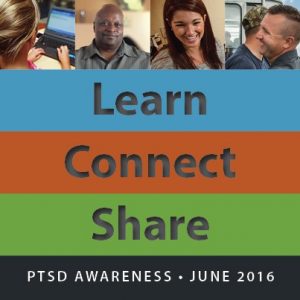Three Easy Steps for You to Share PTSD Awareness
The National Center for Posttraumatic Stress Disorder designated June as posttraumatic stress disorder (PTSD) Awareness Month in an effort to raise awareness, reduce PTSD stigma, and encourage people to seek help for posttraumatic stress disorder. The theme of the awareness campaign is "Learn, Connect, Share," so I thought it would be a good idea to talk about how we all can do those things to raise awareness about PTSD this month.
Learn about PTSD
One of the ways to raise awareness and to reduce the stigma associated with any mental illness is to be knowledgeable about it. When you know the facts about something, it takes the fear out of it. All it takes is a simple Google search for you to find up-to-date  information about PTSD, its symptoms, treatments, and support. In the meantime though, here are a few facts to get you started:
information about PTSD, its symptoms, treatments, and support. In the meantime though, here are a few facts to get you started:
What Is PTSD?
PTSD is a psychiatric disorder that can occur following the experience or the witnessing of a traumatic or life-threatening event like military combat, natural disasters, terrorism, serious accidents, or physical or sexual abuse.
What Are the Symptoms of PTSD?
There are four main categories that the symptoms of PTSD fall under are:
- Reliving the event – this can cause flashbacks, nightmares and intrusive negative thoughts about the event
- Avoidance – this can cause someone to want to avoid people, places, and things that are reminders of the event, he or she may even try to avoid talking about it
- Negative changes in beliefs or feelings – this may cause someone to feel fear, guilt, or shame
- Hyperarousal – this can cause a feeling of being constantly on alert, anxiety or panic attacks, and trouble sleeping
How Common Is PTSD?
It's estimated that seven-eight percent of the U.S. population will have PTSD at some point in their lives.
About eight million people will have PTSD in a given year, and this is only a small portion of those who have experienced trauma.
Approximately 10 percent of women will develop PTSD sometime in their lives, compared with four percent of men.
Connect with Others about PTSD
Connecting with others when it comes to PTSD is easy. If you think that you or someone you know may have PTSD, reach out for help. Help is out there for those of us who suffer from PTSD, you just have to take the first step and ask for it. Check with your medical insurance company for a referral to a therapist that specializes in PTSD therapy, talk to your minister or priest, or contact someone you know with PTSD. I guarantee you that they will be supportive.
Share Your Experiences with PTSD
The only way to increase awareness and reduce the stigma about PTSD is to talk about it. If you have PTSD, share your story with others. Social media lends itself to spreading the word about PTSD -- use it. Hearing others' stories and sharing your own is healing. That's why I write this blog, to help others and to help myself.
What are you going to do to raise awareness about PTSD? Please share your story in the comments below.
Find Jami on Facebook, on Twitter, on Google+, and on her blog, Sober Grace.
APA Reference
DeLoe, J.
(2016, June 16). Three Easy Steps for You to Share PTSD Awareness, HealthyPlace. Retrieved
on 2026, March 3 from https://www.healthyplace.com/blogs/traumaptsdblog/2016/06/ptsd-awareness-month
Author: Jami DeLoe
Awareness needs to increase among psychiatrists/physicians, as well. Almost 40 years ago, my then-husband raped me two weeks after I gave birth. He continued to take what he wanted, when he wanted it, until I escaped with my wee children about 5 years before spousal rape was declared illegal in Canada. My psychiatrist is not quite ready to say that I have PTSD. I am a recovering alcoholic, still fighting a decades-old eating disorder, emotionally blunted, reclusive because I experience social anxiety, overreact to any sort of physical or verbal violence, only recently able to understand my anger and depression. But he's not comfortable with saying I have PTSD. At least I don't live in a society where men own their women's bodies and women are stoned to death for allowing a man to rape them.
Ive battled with PTSD for the past twelve years; I'm a retired combat medic. I worked o the front lines in Iraq and have witnessed some gruesome stuff. After years of trapping myself away in fear of doing harm to people, I started talking about it with counselors and things got a little better. I just published a book about my whole experience to help other people fighting PTSD. http://amzn.com/B01FTA9J7K
thanks for you
The conflict between the will to deny horrible events and the will to proclaim them aloud is the central dialectic of psychological trauma.
You cannot get PTSD from reading a book or from hearing a story, even repeated stories over and over.
Read more at https://hot-etoile.blogspot.com/
